It’s hard to keep your brain in check when life keeps throwing things your way. Assignments, deadlines, social pressures… it all adds up really quickly. And while it’s great to talk it out with a friend, not everyone has that option every time. That’s exactly when the best mental health apps can step in to help you manage stress. They obviously can’t replace real-life help, but they can still give you the right tools so you can feel a little more in control of your life.
We’ve put together this blog to take a closer look at the top options out there. We’ll discuss how these apps actually work and how you can pick one that works best for you. If academic burnout is the source of your stress, mental health support is just one part of the solution. You also have to manage your workload so you actually have time to pay attention to your emotional well-being.
EssayPro has expert writers who can help you stay on top of your deadlines without gluing yourself to the screen. Just tell us, ‘Write my essay,’ and we’ll match you with one of our professionals in just a few minutes.
What is a Mental Health App
Mental health apps are digital tools that help you take control of your emotional and psychological well-being. Some apps guide you through stress or offer ways to calm your anxious thoughts. Others allow you to track your mood daily and reflect on how you’re feeling each day. Depending on the specific app, it can be built around different therapeutic methods or mindfulness tools to guide users through tough days. The top mental health apps often come with tailored exercises and, in some cases, even access to licensed professionals. Not every app is backed by solid research, though, so choosing one designed with care really matters.
What is a Therapy App
A therapy app is still a mental health app, but the two are not interchangeable. Therapy apps come with the additional perk of connecting you with a licensed therapist or counselor; they usually include text, voice, or video sessions, so you can talk to a real person about what’s bothering you.
The main difference between the two is that mental health apps focus on self-guided support (journaling or meditation), while the best therapy apps offer human interaction and, most importantly, clinical help. That being said, some platforms give their users both: think guided tools plus therapist access.


Advantages and Risks of Mental Health Apps
Like anything that lives on your phone, mental health apps come with their share of trade-offs. They can feel like a lifesaver when you’re stuck in your head, but it’s worth looking at the risks before you commit to any of them. Take a look at the table below to understand the main pros and cons of using mental health apps for anxiety or general emotional hardships.
How to Choose the Mental Health App
You don’t need a hundred features built in for your mental health app to work. You just need to find the right one, something that will actually help you feel better. Here’s what to look for when browsing through free mental health apps (and paid ones, too):
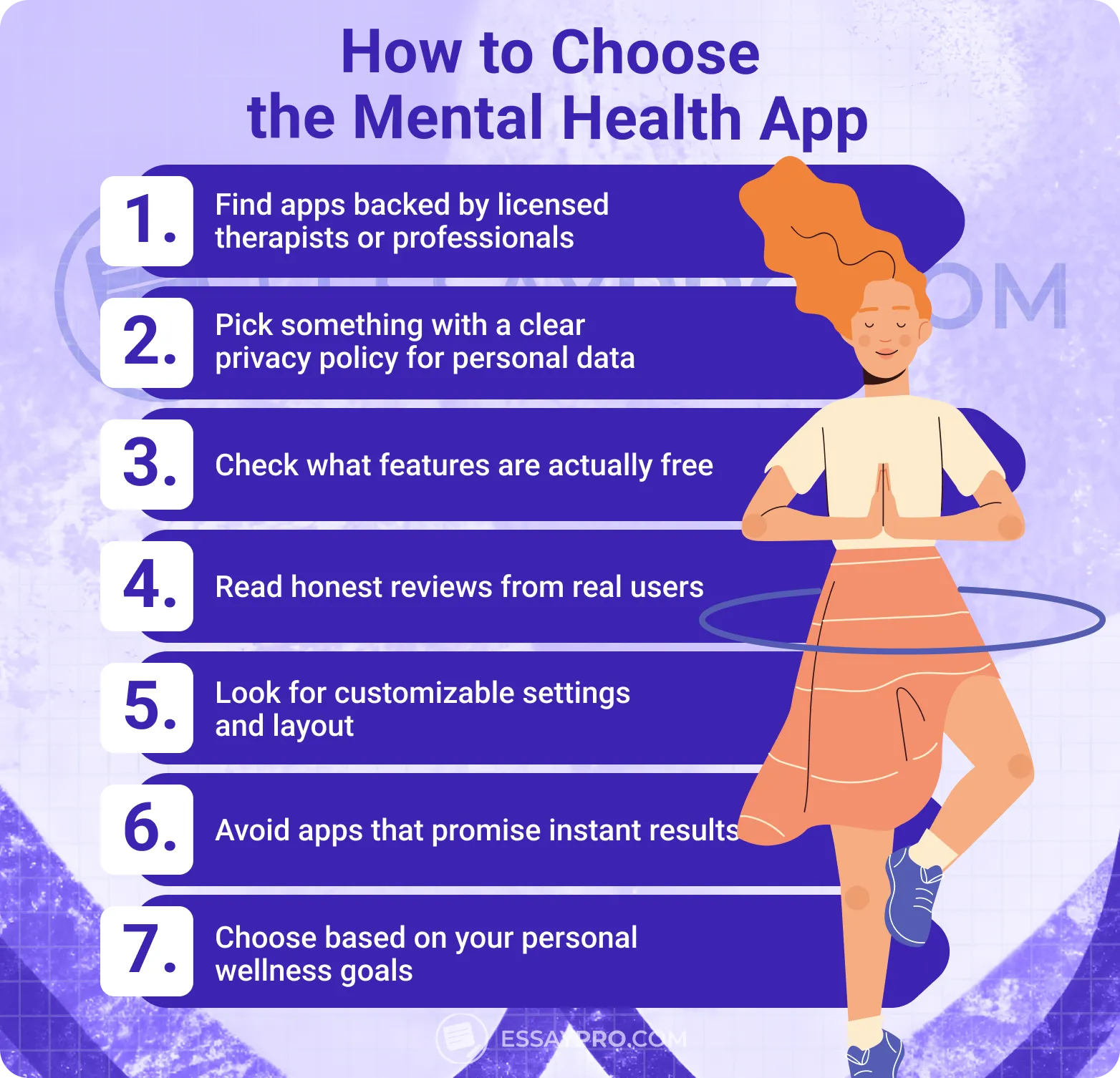
- Make sure the app was created with guidance from licensed therapists or mental health professionals. That means the app is grounded in real methods.
- Check the privacy policy, especially if you’ll be journaling or storing anything personal in the app.
- Take a look at what’s actually free. Some apps might be advertised as free but lock some features behind a subscription.
- Scroll through recent reviews in the app store. Feedback from real users will tell you a lot more than the app description.
- Pick something you can personalize. You should be able to adjust the layout and other features so it’s comfortable for you.
- Stay away from apps that promise to fix everything. Anything claiming instant results should raise a red flag when it comes to mental health.
- Think about your specific goals and choose an app that will support them. For example, if you’re younger or still in school, you might want to explore mental health apps for teens that focus on emotional regulation and stress management.
In the next section, we’ll walk you through the best mental health apps that are definitely worth downloading right now.
Best Mental Health Apps
There’s no single right way to care for your mental health, which is why you need to choose the right app based on your individual needs. If you’re struggling with intrusive thoughts, you probably need something that helps you slow down and breathe. If your mood dips for no clear reason, an app that allows you to reflect might be just what you need. We’ve put together a list of eight apps to help with mental health so you can find the one that’s just right for you.
Smiling Mind

Smiling Mind is one of the best free mental health apps out there. This mindfulness tool was created by Australian psychologists and educators and aims to help users develop emotional resilience through structured, guided meditations.
- Best Suited For: Children and families
- Cost: Free
- Free Trial: Not needed; fully free
- Platforms: iOS, Android, web
- Pros: Developed by professionals, easy to use, great for kids and schools
- Cons: Not as customizable as other apps
- User Reviews: Mostly positive for accessibility
Headspace for Students

Headspace has a student plan that gives you full access to everything it offers (meditations, sleep support, and focus tools) without the usual price tag. It’s the kind of app that feels easy to use from the start, with a simple layout and a calm, steady voice that doesn’t try too hard to be soothing. If you’re one of those people who understand the importance of emotional intelligence in education, Headspace is probably the right app for you.
- Best Suited For: College and university students
- Cost: $9.99/year for students
- Free Trial: 7 days
- Platforms: iOS, Android, web
- Pros: High-quality content, well-researched, excellent interface
- Cons: Limited features without a subscription
- User Reviews: Mostly positive for sleep and anxiety relief
My Possible Self
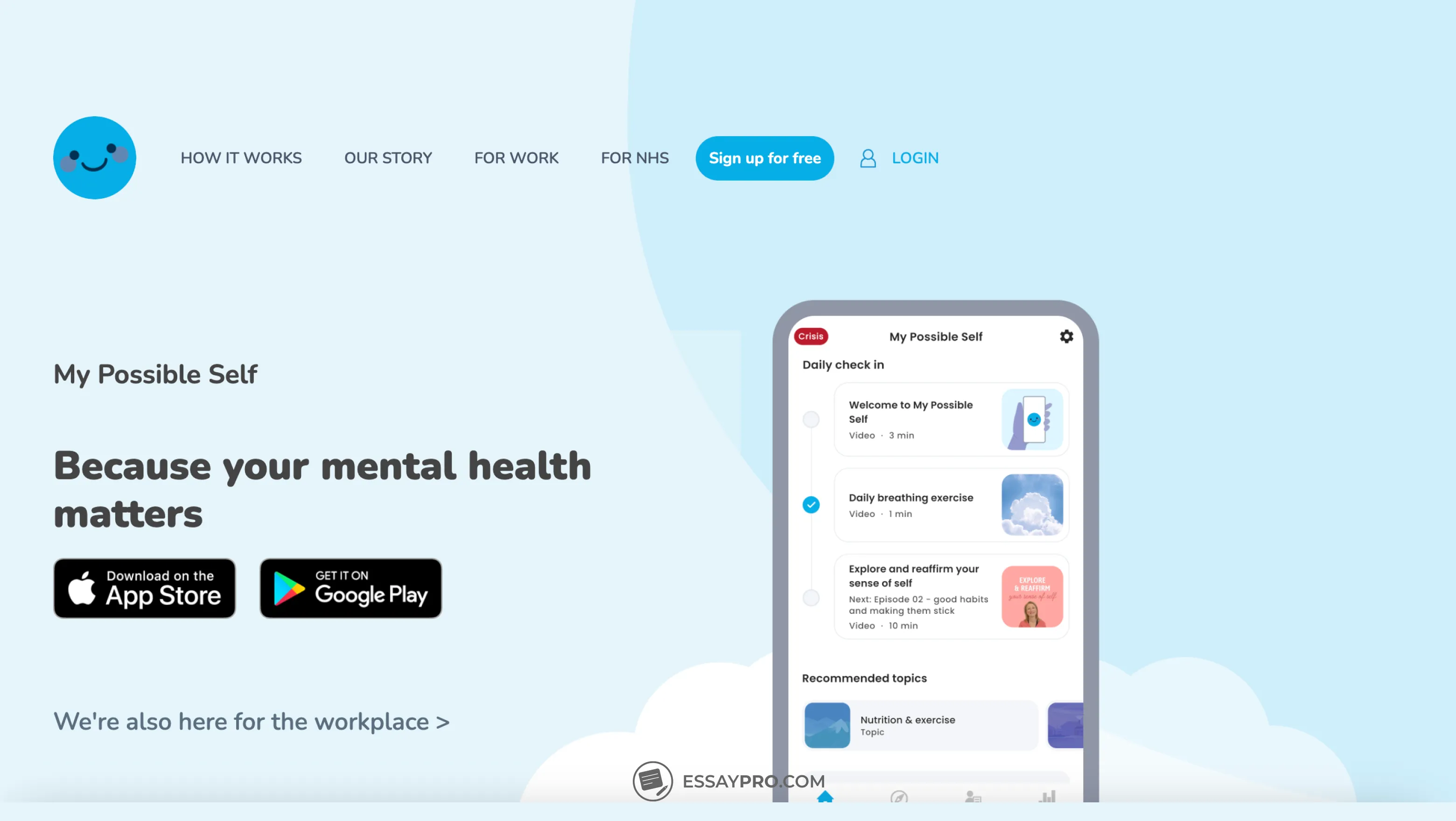
My Possible Self uses therapeutic tools and simple tracking features to help you notice patterns in your feelings. The app uses CBT techniques but is still accessible for anyone; with My Possible Self, you can check in with your mood and habits without it feeling like a chore.
- Best Suited For: Students and adults
- Cost: Free with optional paid features
- Free Trial: Yes; varies depending on in-app purchases
- Platforms: iOS, Android
- Pros: Backed by research, structured mental health modules
- Cons: The interface could feel clunky to some users
- User Reviews: Generally positive for its useful journaling and tracking tools
Worry Watch
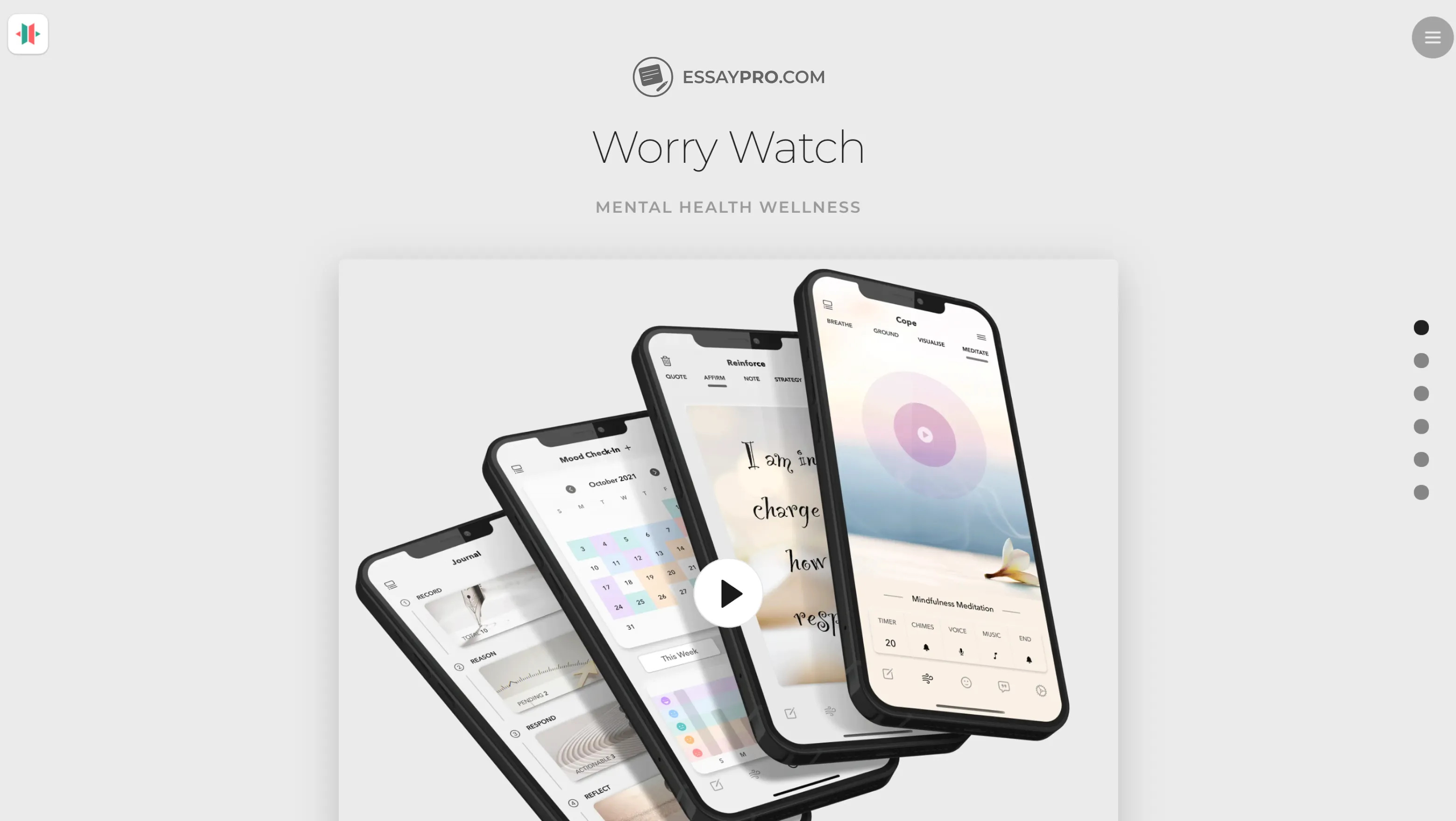
Worry Watch is a simple but powerful app that helps you deal with anxiety by using tools from cognitive behavioral therapy (CBT). It's made for people who want to understand their anxious thoughts better and change how they react to them. For example, if you’re trying to figure out how to start a personal essay, it can help you get more in touch with your experiences and emotions. You jot down what’s bothering you, how anxious you feel, and what kind of thinking traps you might be falling into. Then, over time, you can look back and spot patterns that actually help you feel more in control.
- Best Suited For: People who want to try CBT methods to better manage anxiety
- Cost: Free to download, $2.99 per month or $11.99 per year
- Free Trial: No
- Platforms: iOS only
- Pros: Cheap, helpful CBT tools, keeps your data private
- Cons: Free version is super limited, no Android app
- User Reviews: Loved by those who want real insight into their anxiety, no sugarcoating
BetterHelp
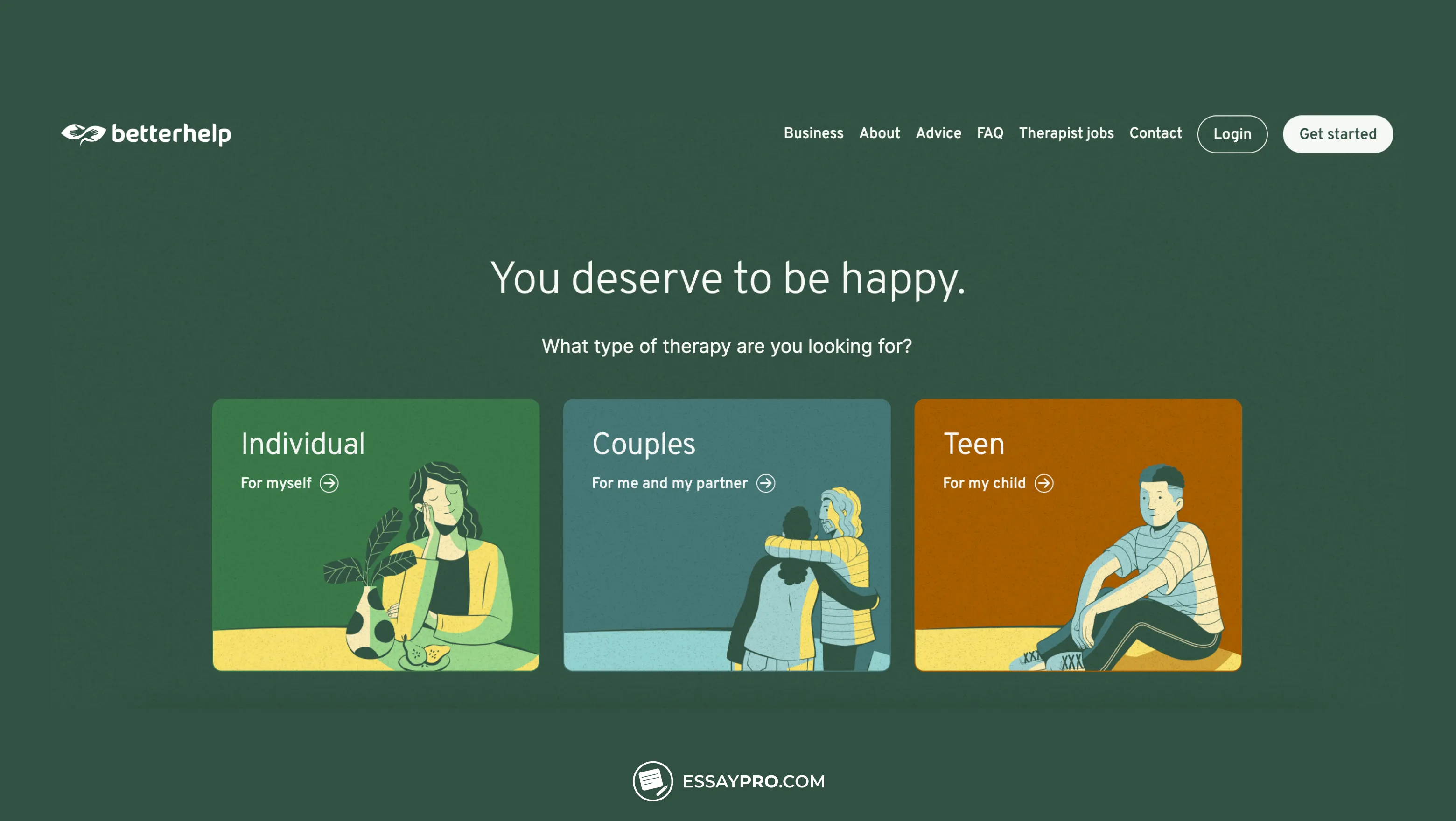
BetterHelp brings mental health support to your fingertips, offering one-on-one therapy through text, live chat, phone, or video. Whether you're navigating anxiety, wrestling with depression, or just trying to stay afloat, you’ll find tailored support grounded in proven methods like CBT. Sessions bend around your schedule, not the other way around.
- Best Suited For: Anyone dealing with stress, anxiety, depression, or seeking emotional clarity
- Cost: Subscription model; financial assistance available for those who qualify
- Free Trial: None, but flexible pricing and aid options offer accessibility
- Platforms: iOS, Android, and web browser
- Pros: Licensed professionals, private and convenient sessions, multiple ways to communicate
- Cons: No face-to-face therapy; pricing may be steep without aid
- User Reviews: Frequently praised for ease of use, therapist quality, and how seamlessly it fits into daily life
Evernote

Evernote wasn’t initially created as a mental health app, but it can still help you process thoughts and manage stress better. This app gives you a space to write things out and make sense of what’s going on in your mind. The art of journaling can be just as helpful as a guided meditation when your head feels full.
- Best Suited For: Anyone needing to journal
- Cost: Free plan available; paid plans start at $10.83/month
- Free Trial: 7 days for premium
- Platforms: iOS, Android, Windows, macOS, web
- Pros: Great for habit tracking and journaling
- Cons: Not built specifically for mental health
- User Reviews: Mixed to positive; highly rated for productivity, less so for emotional tracking
Simple Habit
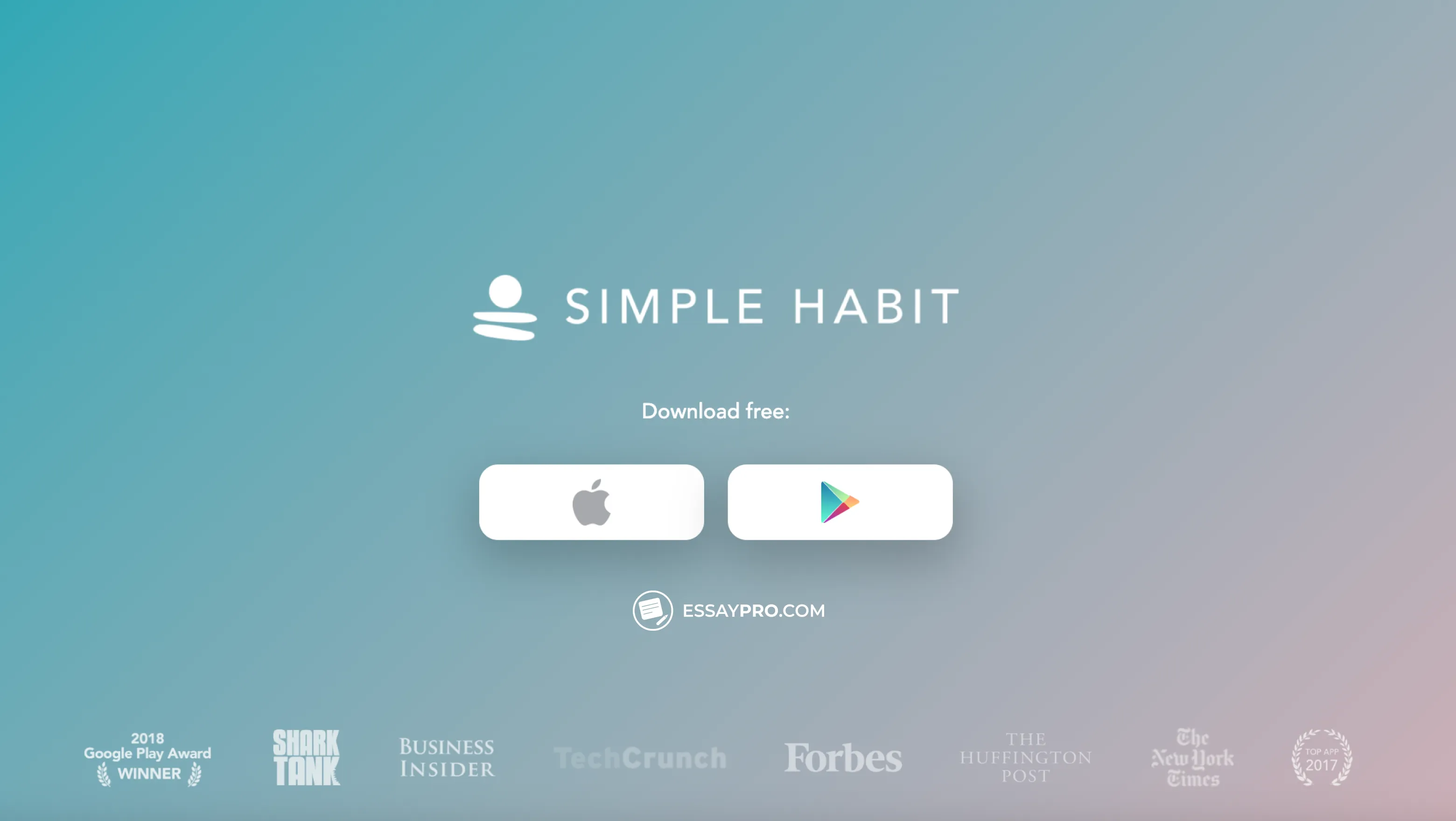
Simple Habit is built around short meditations that fit into busy days. It’s the kind of app you can open in the middle of a hectic schedule and still walk away feeling a little more settled, no matter what’s going on.
- Best Suited For: Anyone looking for guided meditations
- Cost: Free version available; premium is $11.99/month
- Free Trial: 7 days
- Platforms: iOS, Android, web
- Pros: Short meditations, good for beginners
- Cons: Limited content without a subscription
- User Reviews: Mostly positive for on-the-go stress relief
Insight Timer

Insight Timer offers thousands of free meditations, music tracks, and talks from psychologists, teachers, and mindfulness experts. It's one of the largest free meditation platforms available.
- Best Suited For: Anyone needing mindfulness content without paying
- Cost: Free with optional premium ($9.99/month)
- Free Trial: 7 days for premium
- Platforms: iOS, Android, web
- Pros: Huge library, lots of free features
- Cons: Can feel overwhelming due to the sheer volume of content
- User Reviews: Mostly positive for content variety and accessibility
How Many Students Use Therapy Apps?
It’s no secret that college life can take a toll on your mental health. It’s very easy to feel overwhelmed by so many deadlines and the constant pressure to excel at everything life throws your way. Research shows that, too: according to a study published in the Journal of Medical Internet Research, 21.2% of 500 participants said they’ve used a mental health therapy app to support their emotional well-being.
That doesn’t seem like a lot, sure, but these results reflect that the interest in these tools is growing; tech-based mental health resources that don’t require appointments or insurance coverage are becoming a go-to option for a lot of young people who have to deal with stress and anxiety.
Do Therapy Apps Actually Work?
Honestly, that depends on what you’re expecting. If you’re hoping your mental issues will disappear just by using therapy apps without ever seeing a professional, that’s probably not realistic. But if what you’re looking for are practical tools that will help you manage symptoms and build better habits, there are a lot of mental health apps out there that can actually help.
The best mental health apps for therapy - including some of the best AI therapy apps - are developed by real professionals and are based on real techniques, such as CBT or mindfulness training. Some apps even give you access to licensed therapists so you can speak to a real person when you need help. Others offer structured programs designed specifically for stress, sleep, or low mood. Mental health apps can be a useful part of your routine or even a good starting point while you’re waiting for an appointment.
Final Outlook
Sometimes, taking care of your mental health doesn’t necessarily mean sitting in a therapist’s office, going over your childhood trauma or current triggers. There are times when something as simple as finding the right app might be just enough. Many good apps for mental health don’t exactly promise miracles, but they still help you calm your mind or simply make sense of your day when everything feels overwhelming.
Of course, if schoolwork and those non-stop deadlines add to the weight, getting help there matters just as much. There’s absolutely nothing wrong with asking for an extra hand. Taking care of your mind and your workload? That’s just smart. EssayPro is here to help, so you don’t have to do everything on your own.
Is That Pile Of Assignments Scaring You?
You don’t have to do it all on your own! Let EssayPro match you with one of our professional writers.
FAQ
Which Is The Best Online Therapy App?
BetterHelp and Talkspace are two of the most trusted options when it comes to the best online therapy apps. They connect you with licensed therapists and offer flexible plans based on your requirements. That being said, you should always choose the app that works best for you specifically.
What Is The Best App To Help With Mental Health?
If you're looking for a well-rounded mental health app, Headspace is a solid choice. This app gives you tools for sleep and stress management, plus some guided meditation. For those on a budget, Smiling Mind is completely free and designed by professionals.
What Is The Best AI Therapy App?
Wysa is an AI chatbot trained in cognitive behavioral techniques, ready to talk you through waves of stress, dips in mood, or sleepless 2 a.m. spirals. It’s not a stand-in for a real therapist, but in moments when you need a quick, judgment-free space to breathe and reflect, Wysa shows up. Instantly, silently, and without pressure.

Adam Jason
is an expert in nursing and healthcare, with a strong background in history, law, and literature. Holding advanced degrees in nursing and public health, his analytical approach and comprehensive knowledge help students navigate complex topics. On EssayPro blog, Adam provides insightful articles on everything from historical analysis to the intricacies of healthcare policies. In his downtime, he enjoys historical documentaries and volunteering at local clinics.
- Borghouts, J. W., Eikey, E., Mark, G., De Leon, C., Schueller, S. M., Schneider, M., Stadnick, N., Zheng, K., Mukamel, D., & Sorkin, D. (2021). Understanding Mental Health App Use Among Community College Students: Online Survey (Preprint). Journal of Medical Internet Research, 23(9). https://doi.org/10.2196/27745
- University, B. (2024). 15 Mental Wellness Apps That Can Help Every Day | Bradley University Online. Bradley.edu. https://onlinedegrees.bradley.edu/blog/mental-wellness-apps






